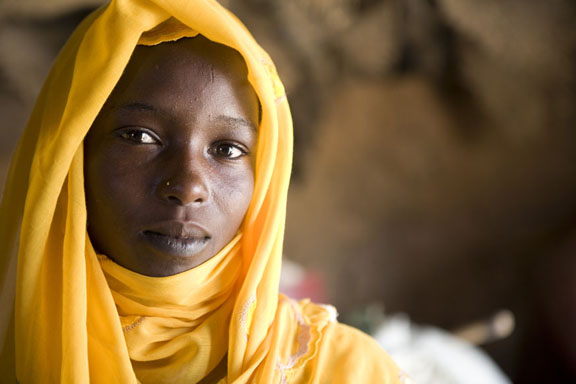Tama
Introduction / History
The number of Tama has been estimated to be between 140,000 to 280,000 people. Though traditional tribal land is split between Sudan and Chad, the vast majority of Tama in Chad live in the Guereda/Biltine prefectures. Over the years, famine, war, marriage, and other life circumstances have caused Tama migrations between Chad and Sudan.
Ties between different ethnic and language groups across Chad and Sudan are complicated. The Tama language is part a larger family of languages spoken by different tribes in Chad and Sudan. Though each language in this family is distinct, significant overlap does allow them to communicate at varying levels with all of them.
The chief of the traditional leaders is a sultan based in Guereda. He consults with a council of elders. He also has a number of Chadian government soldiers under his command. The sultan's successor is chosen from among his sons.
The clan of the sultan, the Oroguk, claim to be descended from the prophet Mohammed and to originate in Iraq. The rest of the Tama clans claim origins in Yemen, settling in the vicinity of Nyere (a sacred mountain located between Guereda and Am Zoer.)
What Are Their Lives Like?
Most Tama are sedentary and cultivate small fields, mainly millet but some sorghum, peanuts and beans. Some own mango or guava trees or cultivate gardens of tomatoes, onions and garlic. Some have cattle, sheep and goats. In the past the Tama had many camels and cattle. As another people group has moved into the Tama region, the Tama have abandoned raising camels due to the risk of being killed for them by this neighboring tribe. Some have a rainy season hut close to their fields, another hut in or near their garden, and a hut in their village or a house in town. Often the men travel with their animals to find grass during part of the year. Village houses and fences are built with straw or grass, while mud brick constructions home are only found in towns. Extreme poverty and lack of hope means that alcohol (millet beer) is a big problem for many Tama. Farming is at a subsistence level with all hoeing, weeding and harvesting done by hand. There is rarely enough surplus to last a second year if the rains do not come. If the rains don't come, people are forced to move away.
The majority of Tama men have lived an average of 4-5 years outside of their traditional region, while women often don't go further afield than their nearest big market, unless they become refugees in times of drought or war.
What Are Their Beliefs?
The Tama have been virtually all Muslim since the 1600s. As is usual in Chad this religion is mixed with animistic practices such as amulets for protection against evil spirits. However, in the last few years, there have been a handful of Tama who have come to faith in Christ.
What Are Their Needs?
Above all, the Tama people need Christ. With avenues to share the gospel like Tama audio Bible stories, and even some scripture, pray that the Lord would open the hearts of the Tama people and many would come to him. Among the Tama believers, they face both persecution from those around them, and the difficulties of living in a remote and challenging place like eastern Chad. Your prayers for their encouragement, growth and perseverance are a way that you can love and serve the them.
.Lack of water for people and animals is a real problem. Yet, during a good rainy season, many of the roads in the region become impassable. There are some Tama villages accessible only by foot or by donkey, not by vehicle. Finding trained teachers willing to work in isolated regions is very difficult and often schools are left without teachers or with sub-standard teachers. The school year is often only 4 or 5 months long due to strikes and the late arrival of teachers. Many Tama have say it would be good to have initial primary school in Tama, with Chadian Arabic as a second choice. Currently all schooling is in French, which most children rarely hear outside the school buildings. With 120 children in a year 1 class, it is difficult for students to get a good educational foundation. After 4 years of school, many cannot even read and write their own name.
Resourced by Joshua Project and workers in Chad

